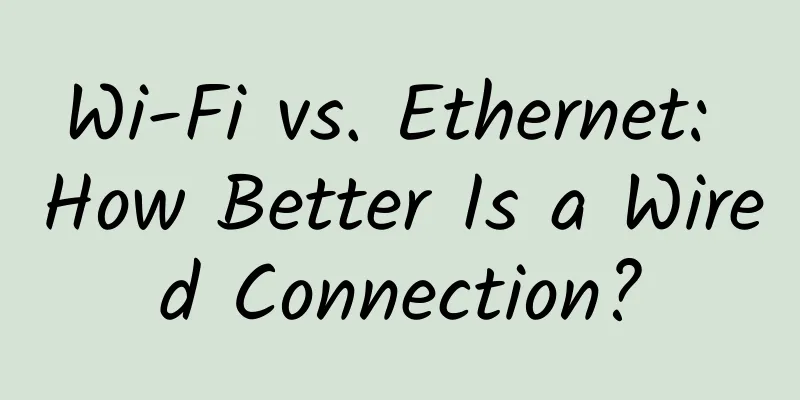Wi-Fi vs. Ethernet: How Better Is a Wired Connection?

|
Wi-Fi is obviously more convenient than wired Ethernet cables, but Ethernet still offers significant advantages. Join us as we look at the pros and cons of wired and wireless connections. You probably won't be connecting your smartphone with an Ethernet cable anytime soon. But it's often worth running Ethernet cables to important devices when you can -- gaming and media computers (or consoles), backup devices, and set-top boxes are just a few examples. To help you decide, we'll look at the three main benefits of using Ethernet over the best Wi-Fi routers -- faster speeds, lower latency, and a reliable connection. How much faster is Ethernet?Ethernet is much faster than Wi-Fi—there's no getting around it. But the real-world difference is smaller than you might think. Wi-Fi has gotten noticeably faster over the past few years, thanks to new standards like 802.11ac and 802.11n, which offer top speeds of 866.7 Mb/s and 150 Mb/s, respectively. While these are maximum speeds shared by all your wireless devices (and you probably won't get those speeds in the real world), Wi-Fi is more than fast enough to handle most of our daily tasks. On the other hand, a wired Ethernet connection can theoretically provide speeds of up to 10 Gb/s if you have Cat6 cable. The exact maximum speed of an Ethernet cable depends on the type of Ethernet cable you use. However, even the commonly used Cat5e cable supports up to 1 Gb/s. And, unlike Wi-Fi, this speed is consistent. While all of these speeds are great, the thing to remember is that your Internet connection speed is the bottleneck for activities involving the Internet. If your Internet speed is significantly slower than whatever type of connection you're using, then increasing the speed of that connection won't do much good. However, Ethernet affects the speed between devices on your network. For example, if you want to transfer files between two computers at home as quickly as possible, Ethernet will be faster than Wi-Fi. Your Internet connection doesn't play a role, so it all depends on the maximum speed your local network hardware can provide. Here are just a few good examples of when local speed might matter:
If you’re curious about the difference in local file transfer speeds, try transferring a large file between two computers when both are connected to Ethernet and when both are connected to Wi-Fi. You should see a speed difference there. How much latency reduction does Ethernet provide?Connection speed and quality isn’t just about raw bandwidth. Latency is also an important factor. Latency, in this case, refers to the time delay it takes for traffic to get from your device to its destination. We often refer to latency as “ping” in the world of networking and online gaming. If you care about minimizing latency—for example, if you're playing an online game and need the fastest reaction time possible—you're probably better off using a wired Ethernet connection. Yes, there will be other latency factors along the Internet path between your device and the game server, but every little bit helps. On the other hand, if you’re just streaming videos, listening to music, or browsing the web, latency won’t matter to you. You can test latency by running the ping command in a terminal or command prompt. Ping the router's IP address while connected via Wi-Fi and while connected via Ethernet. Compare the results to see how much latency Wi-Fi adds. In summary, with Wi-Fi, there is more latency as the signal travels back and forth between your Wi-Fi device and your wireless router. With a wired Ethernet connection, there is much less latency. Wireless Interference and Connection ReliabilityEthernet provides a more reliable connection than Wi-Fi. It's that simple. Wi-Fi is more susceptible to interference than wired connections. The layout of your home, objects that block the signal, interference from electronic devices or neighboring Wi-Fi networks—all of these contribute to Wi-Fi being less reliable in general. This interference can cause many problems:
It’s hard to quantify interference because it tends to ebb and flow — especially when you’re moving around with your device. However, there are things you can do to reduce wireless interference and get the best Wi-Fi signal possible. When does it make sense to use Ethernet?We don’t mean to be too hard on Wi-Fi. It’s super fast, super convenient, and totally usable for most of the things we do online. On the one hand, if you have mobile devices, Wi-Fi is essential. Also, sometimes you don’t have access to Ethernet. Maybe it’s hard to run a permanent, out-of-the-way cable to where you want it. Or maybe your landlord won’t let you run the cable the way you want. That's the real reason to use Wi-Fi: convenience. If your device needs to be moved around, or you just don't want to run cables, then Wi-Fi is the right choice. On the other hand, if you have a desktop PC or server, Ethernet is probably a good option. If you want higher quality streaming (especially if you're doing it from a media server on your network) or if you're a gamer, then Ethernet would be the way to go. Assuming it's easy to plug in your devices with an Ethernet cable, you'll get a more stable connection. In the end, Ethernet offers advantages like faster speeds, lower latency, and more reliable connections. Wi-Fi offers the advantage of convenience and is adequate for most purposes. So you just need to see if your equipment fits into the categories that Ethernet will have an impact on, and then decide if it will make a big enough difference to run some cables. |
<<: Aruba expands SD-WAN services to Alibaba Cloud
>>: There are so many network structures, this one is probably the most controversial one
Recommend
5G messaging is now available for trial use. Will it replace WeChat?
Will 5G messaging, known as a "killer" ...
How do base stations go to the sky?
[[348593]] This article is reprinted from the WeC...
Current status of 5G development: In addition to the "fast Internet speed" in the eyes of ordinary people, what other development prospects are there?
When it comes to 5G, people don’t know much abou...
DesiVPS: $110/month-2*E5-2670v2/64GB/1TB SSD/30TB@10Gbps/San Jose data center
DesiVPS is a foreign hosting company headquartere...
Reject poor digital experience! Riverbed creates agile and visual management solutions
According to an IDC report, by 2018, 67% of the w...
Increase power, adjust location, and switch channels to speed up WiFi.
Have you adapted to your daily work and life afte...
Three-minute review! A quick overview of 5G industry development trends in May 2021
After the rapid development in 2020, 2021 is a cr...
Five ways to ensure your applications are cyber resilient
The massive shift to remote work caused by the CO...
Outlook for domestic 5G development in 2021 (I): Current status
The development of 5G has now become another hot ...
ZJI: Hong Kong server special offer from 450 yuan/month-E5-2630L/16G memory/480G SSD/10M bandwidth/three-network direct connection
ZJI is currently offering a special promotion for...
Shanghai Pudong issued the country's first "blockchain construction standard" in the government sector
Recently, the Pudong New Area's "Governm...
Let's talk about HTTP/3, QUIC, how do they work?
Why do we need HTTP/3? One important reason is to...
GreenCloudVPS 9th anniversary, $15/year KVM-2GB/20GB/2TB/San Jose and other data centers available
GreenCloudVPS recently launched its 9th anniversa...
After three years of cooperation, Huawei and Beijing Ruicheng Times have created a new name card for smart cities
[51CTO.com original article] As soon as I walked ...
[6.18] LOCVPS 20% off, top up 100 get 10 yuan / top up 5000 get 618 yuan, 4G memory package starts from 52 yuan/month
LOCVPS (Global Cloud) has launched this year'...









